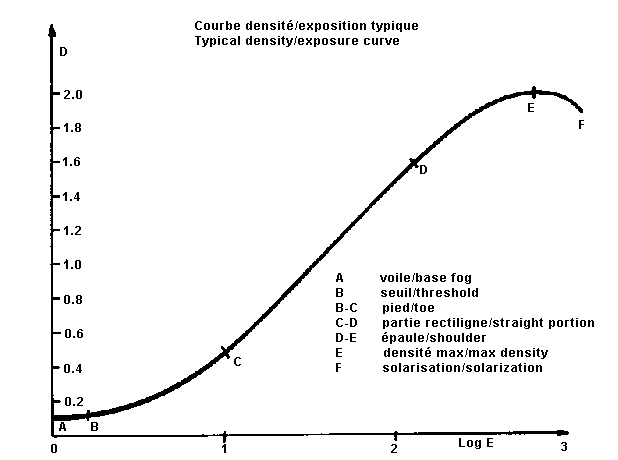
Back to home page
Back to photography main page
Back to techniques page
In this chapter, you'll find some formulas relative to sensitometry.
They are given in a pretty rough mode, the page will be enriched further.
Meanwhile, you can check the following sites for a more verbal explanations:
In French, at Christian Judei
site
In English: a Kodak document
Sensitometry is the art of measuring the relation between an exposure and its effect on
a sensitive surface.
Here is an example for a B/W negative surface (film or paper):

A positive has a falling slope while a color surface is composed of three curves, one each basic color.
Light flux: 1 lux = 1 candela/m2 (1 foot-candle = 10.764 lux)
Exposure: E = lux . seconds often indicated by its
logarithm: log(l.t)
Paper: ![]()
Film: ![]()
Density, mainly with papers, is often indicated in percentage. The conversion formula
is the following:
![]() or
or ![]()
Film speed is measured for the quantity of light producing a density of 0.1 over the film fog and base density.
![]()
Paper speed is measured for the quantity of light producing a density of 0.6 over the paper fog and base density.
![]()
The paper contrast is given according two points:
Hs = exposure to obtain a density of 0.04 over the paper fog and base density.
Ht = exposure to obtain a density of 90% of the maximum density obtainable plus the paper
fog and base density.
![]()
The light meters are set to obtain an average gray around a 18% reflectance.
![]()
K = 12.5 with reflected light, but could vary slightly according the manufacturer.
It's possible to find back the Exposure Value according to the diaphragm and speed used:

f = diaphragm
t = exposure in seconds
Here are some useful and very cheap tools that could help you in testing films/papers:

Left column:
Right column: